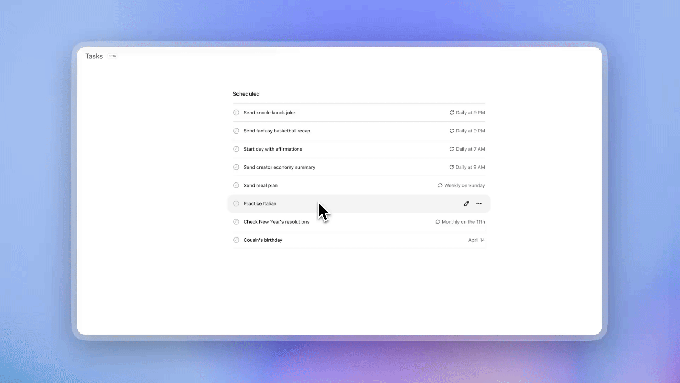From add-on to essential: AI becomes part of the suite deal
AND: OpenAI adds recurring tasks and reminders to ChatGPT, Microsoft uses AI to advance materials science, and more.
The new cost of productivity: AI tools in your office apps
In short: Both Microsoft and Google have announced they will be including their AI chatbots in their office productivity suites - and raising prices.
What's happened: Within a day or two of each other, the industry’s leading office productivity suite providers announced they were making changes to the packaging and pricing of their offerings.
Previously both companies charged extra for their AI chatbots. Now they will be provided as part of suite subscriptions, albeit at an increased price.
First cab off the rank was Google who, according to 9to5Google:
Previously, Google charged an additional $20+ per user/month for Gemini in Gmail, Docs, Meet, and other Workspace apps. The full Gemini experience is now coming to Google Workspace business users as part of a price increase.
In the past, Workspace users only got access to the Gemini app as part of their productivity subscription. To access the Gemini side panel in Gmail and Drive, companies had to pay $20 or $30 per user/month for Gemini Business or Gemini Enterprise, respectively.
Google is making this change because it sees AI as a “foundational shift in how work gets done” and that future productivity advancements will be born out of it. As such, it doesn’t make sense to silo off AI into a different tier. Meanwhile, Google is undercutting competition that has this per user per month model.
Following Google’s announcement, Microsoft responded with its own update, as reported by ZDNet:
If you've got a Microsoft 365 Personal or Family subscription, you're about to get a jumbo serving of AI in your Office apps. Word, Excel, PowerPoint, OneNote, and Outlook will all get a new Copilot button that opens a prompt pane where you can get help writing documents, analysing spreadsheets, summarising email messages, and building presentations. In addition, those subscriptions will get the AI-powered Microsoft Designer app, which can build images from prompts and edit unwanted objects from existing photos.
The new features, announced in a post on the Microsoft 365 blog, will be available as part of the latest Microsoft 365 update and come with a significant price increase. In exchange, subscribers will receive a monthly allotment of 60 AI credits that can be used with Copilot and Microsoft Designer across a variety of apps. The credits reset on the first of each month, regardless of when the subscription renews.
According to these announcements, Microsoft is targeting individual consumers with its changes, while Google is focusing on business customers. It’s likely that similar modifications will soon extend to other licensing arrangements.
Why you should care: Ever since the release of ChatGPT in November 2022 there has been discussion around the adoption rates and tangible benefits users get from their various chatbots.
Both Microsoft and Google have made long-term, multi-billion dollar commitments to AI, and they need to get a return on those investments to justify the market caps they both now enjoy, largely driven off the back of their AI efforts.
If they can say that more users are “using” Copilot or Gemini, then that helps appease investors, and - if usage increases, as it inevitably will - allows both vendors to talk about increasing adoption rates. In turn, this may help crystallise use cases and benefits for those yet to try - or fully embrace - these tools.
The flip side is that there is a risk that both Microsoft and Google risk alienating their customer bases, who may resent any form of price increase and may not want, or be ready to, use these AI tools.
As many suspected, it may have proven difficult to sell Copilot and Gemini as expensive add-ons when the ROI was unclear. Building these into the price of the office suites was inevitable, but perhaps has come sooner than many anticipated.
For corporate users, these announcements may hasten the need to evaluate how to deploy these AI tools, how to manage and protect data, and how to upskill users on how to make effective use of these chatbots.
For more: Keep an eye out for reports of increased adoption rates over the next few months as proof of these changes’ effectiveness.
With OpenAI reporting that ChatGPT has 300 million weekly active users, the pressure was on Microsoft and Google to act quickly before ChatGPT becomes habitual for users. By positioning their equivalents as “free” or at least low cost, the test will be what effect this has on OpenAI’s momentum.
While these changes mark a significant shift, they are not transformational. Currently, AI chatbots remain an add-on to well-established office suites. However, expect to see truly ‘AI first’ applications emerge in 2025 - applications where AI is woven into the user experience rather than simply appended as a dialog box.
OpenAI’s ChatGPT supports task and reminder scheduling
In short: OpenAI has launched a new beta feature for paid ChatGPT users, enabling them to schedule recurring tasks and reminders.
What's happened: Some commentators have downplayed this update as a basic feature rollout, while others view it as OpenAI’s first step toward agentic AI.
TechCrunch explains what the feature enables:
With tasks, users can set simple reminders with ChatGPT such as, “Remind me when my passport expires in six months,” and the AI assistant will follow up with a push notification on whatever platform you have tasks enabled. Users can also now set recurring requests to ChatGPT, such as, “Every Friday, give me a weekend plan based on my location and the weather forecast,” or “Give me a news briefing every day at 7 a.m.”
Anyone used to using Amazon’s Alexa or Apple’s Siri - and others - will be familiar with these types of capabilities.
Why you should care: While it’s clear that this is a basic feature, it’s a smart move by OpenAI to gather user feedback and refine what people really want right now.
With the ever-increasing noise around agents, there is a risk - once again - that reality may not live up to the hype, at least in the short-term. As TechCrunch notes:
The new task feature appears to be OpenAI’s first step into AI models that can act somewhat independently, also known as AI agents. OpenAI CEO Sam Altman says that 2025 will be big for AI agents, even claiming they will “join the workforce” this year. Tasks is a fairly limited version of an agentic system, but it allows users to set reminders with ChatGPT, a practical feature most people have come to expect from assistants like Siri and Alexa. The scheduled information requests are more unique, showing new capabilities that previous digital assistants were not capable of.
I’ve long-argued that the industry risks driving too hard, too fast and leaving businesses and users behind. As much as we might want it - or think we want it - we are simply not ready to abdicate or outsource important tasks to AI agents.
By introducing Tasks, OpenAI not only enhances functionality but also gathers valuable feedback to shape the next generation of AI features. This iterative approach is essential for aligning product development with real user needs.
For more: For more, keep an eye on the evolving landscape. As seen with Microsoft’s and Google’s recent announcements, the battle for chatbot mindshare is intensifying. Expect to see additional releases - both incremental and significant - as leading AI companies gear up for the next phase of growth and customer lock-in.
Links
Moving away from desktop productivity, Microsoft Research unveiled MatterGen, a generative AI tool for computationally designing and predicting the behaviour of new materials. This is seen by some as having the transformative potential to accelerate innovation in material science by reducing the traditional trial-and-error process, positioning it as a game-changer for industries like energy and healthcare. (Microsoft)
Published ahead of Trump’s inauguration, OpenAI released a 15-page economic blueprint outlining their vision for AI's role in the United States. The document emphasised the need for U.S. leadership in AI development and regulation while highlighting economic opportunities and challenges. No doubt politically motivated, this shows how nation states should be considering the opportunities and risks of not taking advantage of AI. (OpenAI)
Thanks for reading this newsletter. If you have any feedback on how it could be improved, or what you would like to see, please reach out.
Tim






